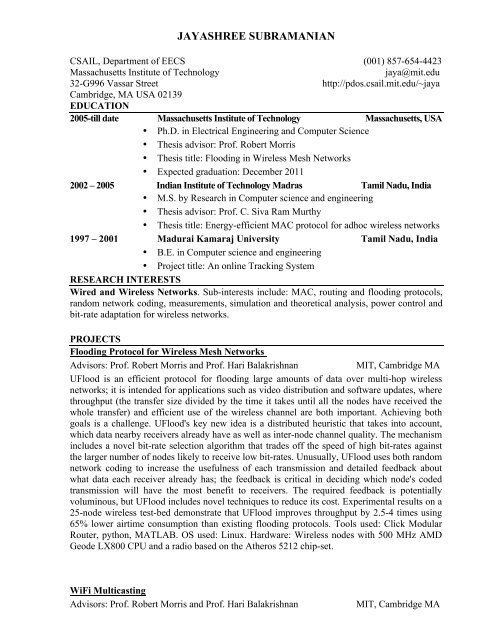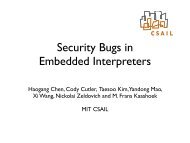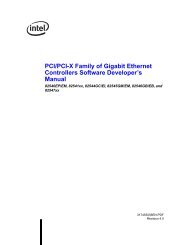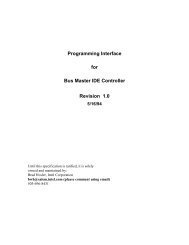JAYASHREE SUBRAMANIAN - PDOS - MIT
JAYASHREE SUBRAMANIAN - PDOS - MIT
JAYASHREE SUBRAMANIAN - PDOS - MIT
Create successful ePaper yourself
Turn your PDF publications into a flip-book with our unique Google optimized e-Paper software.
<strong>JAYASHREE</strong> <strong>SUBRAMANIAN</strong><br />
CSAIL, Department of EECS (001) 857-654-4423<br />
Massachusetts Institute of Technology jaya@mit.edu<br />
32-G996 Vassar Street http://pdos.csail.mit.edu/~jaya<br />
Cambridge, MA USA 02139<br />
EDUCATION<br />
2005-till date Massachusetts Institute of Technology Massachusetts, USA<br />
• Ph.D. in Electrical Engineering and Computer Science<br />
• Thesis advisor: Prof. Robert Morris<br />
• Thesis title: Flooding in Wireless Mesh Networks<br />
• Expected graduation: December 2011<br />
2002 – 2005 Indian Institute of Technology Madras Tamil Nadu, India<br />
• M.S. by Research in Computer science and engineering<br />
• Thesis advisor: Prof. C. Siva Ram Murthy<br />
• Thesis title: Energy-efficient MAC protocol for adhoc wireless networks<br />
1997 – 2001 Madurai Kamaraj University Tamil Nadu, India<br />
• B.E. in Computer science and engineering<br />
• Project title: An online Tracking System<br />
RESEARCH INTERESTS<br />
Wired and Wireless Networks. Sub-interests include: MAC, routing and flooding protocols,<br />
random network coding, measurements, simulation and theoretical analysis, power control and<br />
bit-rate adaptation for wireless networks.<br />
PROJECTS<br />
Flooding Protocol for Wireless Mesh Networks<br />
Advisors: Prof. Robert Morris and Prof. Hari Balakrishnan <strong>MIT</strong>, Cambridge MA<br />
UFlood is an efficient protocol for flooding large amounts of data over multi-hop wireless<br />
networks; it is intended for applications such as video distribution and software updates, where<br />
throughput (the transfer size divided by the time it takes until all the nodes have received the<br />
whole transfer) and efficient use of the wireless channel are both important. Achieving both<br />
goals is a challenge. UFlood's key new idea is a distributed heuristic that takes into account,<br />
which data nearby receivers already have as well as inter-node channel quality. The mechanism<br />
includes a novel bit-rate selection algorithm that trades off the speed of high bit-rates against<br />
the larger number of nodes likely to receive low bit-rates. Unusually, UFlood uses both random<br />
network coding to increase the usefulness of each transmission and detailed feedback about<br />
what data each receiver already has; the feedback is critical in deciding which node's coded<br />
transmission will have the most benefit to receivers. The required feedback is potentially<br />
voluminous, but UFlood includes novel techniques to reduce its cost. Experimental results on a<br />
25-node wireless test-bed demonstrate that UFlood improves throughput by 2.5-4 times using<br />
65% lower airtime consumption than existing flooding protocols. Tools used: Click Modular<br />
Router, python, MATLAB. OS used: Linux. Hardware: Wireless nodes with 500 MHz AMD<br />
Geode LX800 CPU and a radio based on the Atheros 5212 chip-set.<br />
WiFi Multicasting<br />
Advisors: Prof. Robert Morris and Prof. Hari Balakrishnan <strong>MIT</strong>, Cambridge MA
Multicast is a popular way to distribute live streams, such as seminars and lectures, inside<br />
campuses and companies. With the rapid rise in WiFi-connected clients, the delivery of such<br />
multicast streams over infrastructure 802.11 networks is becoming important. Unfortunately,<br />
multicast over such networks is often inefficient, suffering from low throughput and<br />
significantly reducing the capacity available for other traffic. UCast is a system that uses<br />
cooperative client flooding to improve the delivery of WiFi multicast streams. UCast clients<br />
subscribed to a given multicast group along with the WiFi access points form a cooperative<br />
mesh network over which the multicast data is distributed from APs to the clients. The key to<br />
making this idea work is to use an efficient and robust flooding of data over the cooperative<br />
mesh. Experimental results over an indoor WiFi test-bed show that UCast can achieve about 4-<br />
7 times improvement in throughput over a scheme that is similar to it except that only APs send<br />
data and over DirCast+, an existing WiFi multicast protocol. Tools used: Click Modular<br />
Router, python, MATLAB. OS used: Linux. Hardware: Wireless nodes with 500 MHz AMD<br />
Geode LX800 CPU and a radio based on the Atheros 5212 chip-set.<br />
Power Control for Wireless Mesh Networks<br />
Advisors: Prof. Robert Morris and Prof. Hari Balakrishnan <strong>MIT</strong>, Cambridge MA<br />
This project analyzes the effect that sophisticated power control mechanism might have on<br />
total throughput of wireless networks. Contrary to the popular belief, the project's main<br />
conclusion, based on theoretical and experimental studies, is that for any two sender topology<br />
the best strategy is either for the stations to send one at a time, or for them to send concurrently<br />
at the maximum power level of which they are capable and that there is no use of any adaptive<br />
power control mechanisms. The analysis derives the general expression for the transmit power<br />
that maximizes the throughput for the two-sender physical topologies. This expression is found<br />
to correspond to the cases where one node transmits or both the nodes transmit at a time with<br />
maximum transmission power. The project goes on to present measurements from an 802.11<br />
test-bed for the two-sender topology, in order to see if the conclusions from the theoretical<br />
analysis hold in practice. Tools Used: Click Modular Router, Python, MATLAB.<br />
Energy-Efficient MAC Protocol for Ad hoc Networks<br />
Advisor: Prof. Siva Ram Murthy IIT Madras, India<br />
Designed a MAC protocol that exploits the chemical effects and behavior of the batteries,<br />
which power the nodes of ad hoc networks. BAMAC is the first protocol to explicitly use<br />
battery state for designing a MAC scheme. It maximizes battery lifetime using a round robin<br />
node scheduling of ad hoc node. Probabilistic model using a Discrete–time Markov chain and a<br />
simulator designed using GloMoSim was developed to analyze BAMAC. Both the models<br />
show that lifetime of ad hoc nodes that use BAMAC improve by 30% compared to 802.11 and<br />
other known MAC protocols. HBAMAC is a variation of BAMAC that works for<br />
heterogeneous batteries in the network. Tools used: GloMoSim Simulator, MATLAB 6.1<br />
TEACHING AND WORK EXPERIENCE<br />
2002-2005 Project Associate, Department of Science and Technology, India.<br />
Resource Management in High-Performance Real-Time systems and Networks<br />
Summer 2000 Internship at T.V.S. and Sons (P) Ltd, India<br />
2005-2008 Research Assistant, Computer science and Artificial Intelligence Laboratory,<br />
<strong>MIT</strong><br />
Spring 2008 Teaching Assistant for 6.829 (Computer Networks)<br />
Instructors: Prof. Hari Balakrishnan and Dr. Bruce Davie<br />
2009-Fall 2010 Research Assistant, CSAIL, <strong>MIT</strong><br />
Spring 2010 Teaching Assistant for 6.02 (Introduction to EECS: Digital Communications)<br />
Instructors: Prof. Chris Terman, Prof. Hari Balakrishnan, and Prof. Jacob White.<br />
2
REFEREED PUBLICATIONS<br />
• Jayashree Subramanian, Robert Morris, and Hari Balakrishnan, “UFlood: Flooding in<br />
Wireless Mesh Networks”, To be published in INFOCOM 2012.<br />
• S. Jayashree, B.S. Manoj and C. Siva Ram Murthy, " Network Lifetime Driven MAC<br />
Protocols for Ad hoc Wireless Networks", WINET Journal, Vol 14, No. 6, 2008.<br />
• S. Jayashree and C. Siva Ram Murthy, "A Taxonomy of Energy Management Protocols<br />
for Ad hoc Wireless Networks", IEEE Communication Magazine, Vol. 25, No. 4, 2007.<br />
• S. Jayashree, B.S. Manoj, and C. Siva Ram Murthy, ``A Novel Battery Aware MAC<br />
Protocol for Ad hoc Wireless Networks", in Proc. 11th International Conference on<br />
High Performance Computing (HiPC), Bangalore, December, 2004.<br />
(Won the best paper award)<br />
• S. Jayashree, B.S. Manoj, and C. Siva Ram Murthy, ``On Using Battery State for<br />
Medium Access Control in Ad hoc Wireless Networks", in Proc. 12th ACM Annual<br />
International Conference on Mobile Computing and Networking (MOBICOM),<br />
Philadelphia, USA, September, 2004.<br />
SKILLS & TOOLS<br />
Languages : C, C++, UNIX Scripting, HTML, PHP, PERL.<br />
Packages : CLICK Modular Router, MATLAB, GloMoSim<br />
Operating system : Linux<br />
AWARDS & ACHIEVEMENTS<br />
• Recipient of the Best Paper Award for the paper entitled “A Novel Battery Aware<br />
MAC Protocol For Ad hoc Wireless Networks”, co-authored with B. S. Manoj and C.<br />
Siva Ram Murthy at the 11 th International Conference on High Performance Computing<br />
to be held in Bangalore, India during December 19-22, 2004.<br />
• Won IBM IRL, India Scholarship to attend the ACM MobiCom Conference held in<br />
Pennsylvania, PA, USA.<br />
• Won the academic excellence award for B.E.<br />
PROFESSIONAL ACTIVITIES AND TALKS<br />
• ‘On Using Battery State for Medium Access Control in Ad hoc Wireless Networks’,<br />
MOBICOM 2004<br />
• ‘A Novel Battery Aware MAC Protocol for Ad hoc Wireless Networks’: HIPC 2004<br />
(Best paper talk)<br />
• Visited BELL LABS, Murray hill, USA and presented a talk on my research findings<br />
• Reviewer: IEEE Transactions on Mobile Computing<br />
• Worked as Information Technology Chair (2006-2011) for Tang Hall Residence of<br />
<strong>MIT</strong>, designed their webpage: http://tang.mit.edu<br />
REFERENCES<br />
Prof. Robert Morris Prof. Hari Balakrishnan<br />
Dept. of EECS Dept. of EECS<br />
Massachusetts Institute of Technology, USA Massachusetts Institute of Technology, USA<br />
Ph: (001) 617-253-5983 Ph: (001) 617-253-8713<br />
Email: rtm@lcs.mit.edu Email: hari@mit.edu<br />
3





